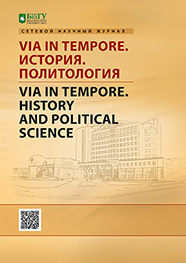LANGUAGE POLICY OF LEADING EUROPEAN UNION MEMBER STATES AND PROSPECTS OF ITS DEVELOPMENT
DOI:
https://doi.org/10.18413/2687-0967-2020-47-2-387-396Keywords:
language policy, equality, multilinguism, migration flows, regulation, solidarity, intercultural diversity, national identityAbstract
The unity of Europe is an important political and economic achievement, which made all the European languages, except English, lose their communicative value and national positions. External language policy regulation in the European union is connected with two human necessities – the necessity to express your national identity and the necessity of mutual understanding. The authors of the article consider external and internal factors affecting the formation of language policy in the current frameworks of the EU. Having studied the recent political situation inside and outside the EU and their impact on language policy, the authors highlight the causes of low efficient EU language policy at the present. Despite the fact that the European strategy of multilinguism, which defines linguistic and cultural diversity as an inalienable part of the European identity, one can observe the trend that fear of diversity appears to be far more common than fear of uniformity. Moreover, in the light of immigrants’ flow the policy of multilinguism has become a stumbling block for the governments of many EU states. In spite of the fact that there are a lot of EU programmes aimed at helping immigrants get assimilated in the EU society, the immigrants hardly get assimilated in the European community, thus, they break common European traditions. And it has become the reason why the French government has to reshape its immigration policy.
Downloads
References
Кельчевский А. 2003. Языковая политика: опыт Франции. Мир русского слова. 1: 111–113. URL: http://mirs.ropryal.ru/мир-русского-слова-2003-№-1 (дата обращения: 18.12.2019).
Рекош К.Х. 2014. Языковая политика в Европе – Вавилоне XXI века. Вестник МГИМО. 3: 225–228.
Acquisition of citizenship statistics. 2018. Веб-сайт Евростата. Март. URL: https://ec.europa.eu/eurostat/statistics-explained/index.php/Acquisition_of_citizenship_statistics (ac-cessed: 18.12.2019).
Bandov G. 2013. Language Policy of the European Union – Realization of the Multilingual Policy of the EU. Međunarodne studije. 1. URL: https://hrcak.srce.hr/file/181705 (accessed: 18.12.2019).
Civil Society Platform on Multilingualism. 2011. Policy Recommendations for the Promo-tion of Multilingualism in the European Union. June 9. URL: http://ec.europa.eu/dgs/education_culture/repository/languages/information/documents/report-civil-society_en.pdf (accessed: 12.12.2019).
Christiansen P.V. 2006. Language policy in the European Union: European/English/Elite/Equal/Esperanto Union? Language Problems & Language Planning. 1. URL: http://ns1.esperanto-jongeren.nl/pdf/EuropeanUnion.pdf (accessed: 18.12.2019).
Christiansen P.V. 2006. Language policy in the European Union. Rosklide University Press. URL: http://ns1.esperanto-jongeren.nl/pdf/EuropeanUnion.pdf (accessed 18.12.2019).
Climent-Ferrando V. 2016. Linguistic Neoliberalism in the European Union. Politics and Policies of the EU’s Approach to Multilingualism. Journal of Language and Law. № 66. URL: https://www.raco.cat/index.php/RLD/article/viewFile/317802/407815 (accessed: 14.12.2019).
Corsican Assembly passes co-official status for Corsican and French. 2013. Nationalia.info: 17 мая. URL: https://www.nationalia.info/new/9861/corsican-assembly-passes-co-official-status-for-corsican-and-french (accessed: 12.12.2019).
Council Resolution of 21 November 2008 on a European strategy for multilingualism. 2008 / the Council of the European Union. November 21. URL: https://eur-lex.europa.eu/legal-content/EN/ALL/?uri=CELEX:32008G1216(01) (accessed: 10.12.2019).
ELAN: Effects on the European Economy of Shortages of Foreign Language Skills in Enter-prise. 2006. CILT, the National Centre for Languages. December. URL: http://ec.europa.eu/dgs/education_culture/repository/languages/information/documents/report-civil-society_en.pdf (accessed: 07.12.2019).
Endangered languages and linguistic diversity in the European Union. 2013. Directorate general for internal policies, culture and education. Policy department B. March. URL: http://www.europarl.europa.eu/RegData/etudes/note/join/2013/495851/IPOL-CULT_NT(2013)495851_EN.pdf. (accessed: 10.12.2019).
Europe migrant crisis: Surge in numbers at EU borders. 2015. BBC News. 18 Sep. URL: https://www.bbc.com/news/world-europe-33972632 (accessed: 10.12.2019).
Europeans and their Languages. 2012. The European Commission, Directorate-General for Education and Culture, Directorate-General for Translation and Directorate-General for Interpretation. June. URL: http://ec.europa.eu/commfrontoffice/publicopinion/archives/ebs/ebs_386_en.pdf (accessed: 07.12.2019).
French the new lingua franca of the world – vraiment? 2017. Theguardian.com: 2 декабря. URL: https://www.theguardian.com/commentisfree/2017/dec/02/french-language-world-lingua-franca-emmanuel-macron-optimism-grandiose (accessed: 21.12.2019).
Kraus P.A. 2014. Addressing linguistic diversity in the European Union: strategies and di-lemmas Ethnicities. 14: 4. URL: https://helda.helsinki.fi//bitstream/handle/10138/233226/Addressing_linguistic_diversity_in_the_European_Union_ca_February_26_2014_2.pdf?sequence=6 (accessed: 14.12.2019).
Official languages of the EU. 2014. Web-site of education and training of the European Commission. 26 июня. URL: http://ec.europa.eu/education/official-languages-eu_en (accessed: 07.12.2019).
Report of European Commission: Europeans and their languages. 2016. URL: http://ec.europa.eu/commfrontoffice/publicopinion/archives/ebs/ebs_386_en.pdf (accessed: 10.12.2019).
Wilsher K. Emmanuel Macron launches global campaign to promote French speaking. 2018. The Guardian. 28 March. URL: https://www.theguardian.com/world/2018/mar/20/emmanuel-macron-campaign-french-speaking (accessed: 10.12.2019).
Working document № 9 for the bureau on The language regime: additional options, Brussels. 2001. August 29. URL: http://www.europarl.europa.eu/meetdocs/committees/budg/20010912/DT9en.pdf (accessed 07.12.2019).
Abstract views: 921
Share
Published
How to Cite
Issue
Section
Copyright (c) 2020 Via in tempore. History and political science

This work is licensed under a Creative Commons Attribution 4.0 International License.


